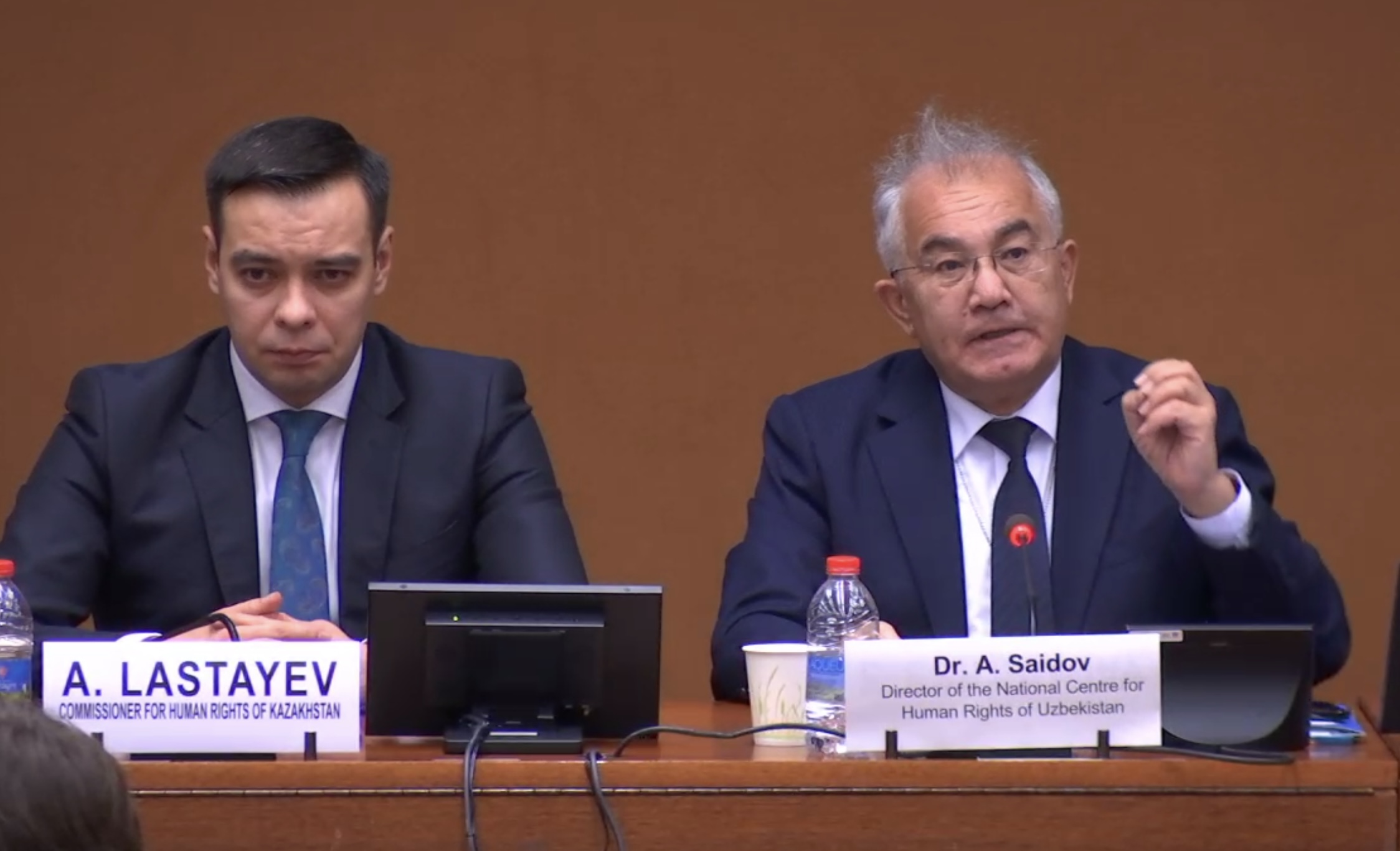ASTANA – Kazakhstan has developed a wide-ranging human rights strategy that aligns with the objectives of sustainable development, said Human Rights Commissioner Artur Lastayev during the Contribution of National Human Rights Institutions (NHRIs) to the implementation of the 2030 Agenda for Sustainable Development conference on the sidelines of the Human Rights 75 high-level event on Dec. 11 in Geneva.

Kazakhstan’s Human Rights Commissioner Artur Lastayev and Director of the National Center for Human Rights of Uzbekistan Akmal Saidov. Photo taken from the online translation of the conference.
Summarizing the country’s work to bolster human rights, Lastayev mentioned the constitutional reform that was carried out in Kazakhstan last year, which expanded the powers of the Parliament, simplified the procedure for registering political parties, abolished the death penalty, and restored the Constitutional Court.
Kazakhstan’s efforts in human rights support are not confined to political reforms but also cover areas such as the judicial system, labor rights, women’s empowerment and strengthening human rights institutions.
“The Commissioner for Human Rights has acquired the status of an independent constitutional official. The list of prohibited types of work for women has been removed from the Labor Code to eliminate gender-based discrimination. The Social Code has been adopted and a number of normative legal acts have been amended and supplemented to provide social assistance, medical services and education to migrants, refugees and members of their families,” said Lastayev.
“This year, Kazakhstan ratified the optional protocol to the Convention on the Rights of Persons with Disabilities and signed the optional protocol to the Convention on the Rights of a Child,” he added.
Significant expansion of the Commissioner for Human Rights mandate and appointment of the representatives of the commissioner in all regions of the country were among the most important steps towards human rights protection.
“This year, the participation of my representatives in the adoption of decisions of regional significance is actively expanding. Representatives of the Commissioner for Human Rights are included in all consultative and advisory bodies under the governors. Their effective work will also be facilitated by organizational and training activities planned in the coming period with the participation of the United Nations Development Program (UNDP), and our other friends and partners,” said Lastayev.
According to him, these steps reaffirmed Kazakhstan’s commitment to the United Nations’ call for active action on human rights and the integration of sustainable development goals into all aspects of the state’s activities.
The country is listed among the top five in the world in terms of digitalization and timelines of decision-making, according to Lastayev.
“I have also made proposals to the presidential administration, the government and other authorized state bodies on the issues of cassation proceedings and improving access to legal assistance of a lawyer. In keeping with our role as a bridge between the state and civil society, jointly with the Commission on Human Rights under the President, we managed to bring the issues of the right to a fair trial and access to justice to the discussion of a special session of a conference in Astana,” said Lastayev.
The international scientific and practical conference organized by the Human Rights Commissioner’s Office on Dec. 7 gathered key representatives of government and human rights protection institutions to address Kazakhstan’s progress in human rights.
Lastayev also emphasized the importance of consolidating efforts at the regional and international level when it comes to setting an agenda for human rights development.
“We cannot succeed unless we build quality partnerships at the local, regional and global international levels built on shared principles and values that are people-centered. In this regard, the importance of interregional cooperation within the platforms of the Eurasian Ombudsman Alliance and the Association of National Human Rights Institutions and Ombudsmen of the Turkic States should be emphasized,” said Lastayev.
“Establishing and strengthening regional dialogue can be a powerful tool for promoting the human rights agenda in the region, where there are so many simple similarities in culture, religion, and even language. Advancing human rights in one country gives impetus to the whole region. By working together at the regional level, we can develop more effective and sustainable solutions to human rights challenges and share our best practices,” he added.
